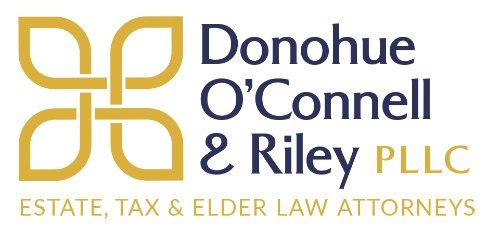
Back in 1991, managing member Joe Donohue’s grandmother Audrey wrote a letter to her family with instructions on what to do when a loved one dies. She wrote this letter when her own mother passed away at the age of ninety-seven. We can all learn from her practical guide.
1. Primary Decisions about the Ceremony – these should be made immediately after the deceased has passed away, if not earlier. The deceased should also be encouraged to consider these decisions in his or her old age so that the family can celebrate his or her life in accordance with his or her wishes:
a. Number of receiving days and date of funeral
b. Burial or Cremation
i. Casket – open vs. closed or concrete vault
ii. Was the deceased an organ donor? If so, you may wish to discuss arrangements with the funeral director regarding the necessary time frame
c. Nature of the ceremony, in particular, whether it will adhere to a religious tradition (additional checklists for different religious traditions are included below)
i. If a casket will be used, who will be pall bearers – family, cousins, friends or funeral home bearers?
ii. Transportation to the ceremony – will you employ a hearse and/or hire a limo for immediate family?
iii. Participants – who will speak at the ceremony? Will they read a prayer or poem, give a eulogy or
perform a piece of music? Will invited guests be welcomed to say a few words?
iv. Flowers – decide on the types of arrangements and how to transport them to each location
v. Leaflets/ Prayer cards – decide on the formatting and information to be included
vi. Ordering a headstone and purchasing a cemetery plot
2. Banking:
a. Locate the banking information of the deceased, including their account numbers for checking and savings
accounts and information on retirement accounts. Look out for money that is regularly deposited in the
deceased’s checking accounts, such as Social Security and pension checks. Deposits made after death may need to be returned.
b. If possible, establish a co-depositor before the deceased passes away
c. Be sure remaining household bills get paid
d. If possible, have checks ready for:
i. Excavation of grave
ii. Organist
iii. Funeral fees
3. Appointments
a. Be sure to cancel any appointments for the deceased as well as for family members that would conflict with
‘‘funeral planning and services (dentist, doctor, etc.)
b. Make appointment with funeral home
i. Be prepared to provide the answers to Primary Decision questions (see Section I)
ii. Bring:
1. Cemetery deed (if applicable)
2. If advised, bring clothing, jewelry, photo of the deceased and any other burial items (i.e., rosary, tallit prayer shawl, etc.)
3. Obituary Information, including date of birth, date of death, significant life events and surviving and pre-deceased family
4. Checks for service providers (funeral home will distribute them)
c. Request death certificates to be provided to all necessary companies and agencies, which may include:
i. Bank(s)
ii. Life Insurance company
iii. Medical and prescriptions offices
iv. Pension checks (for transfer to surviving partner)
v. Social Security checks (for transfer to surviving partner)
vi. Probate court for will
d. Select Casket/Request Concrete Vault
e. Make appointments with an attorney, financial advisor and accountant, preferably when family
members are in town
4. Phone Calls
a. Informing loved ones – in advance (if possible) make a list of people who should be contacted when the deceased has passed away
i. For family members and friends who live far away, ideally reach out personally at a time when you know they will not be occupied or alone
ii. Many families choose to send a notice via email to the deceased’s extended network, such as, their congregation, workplace or organization at which they volunteer
iii. Consider who will be invited to the funeral, both the service and the reception, and decide on a method for extending invitations (email or paper mail)
b. Once dates are set with the funeral director, start calling relevant companies and agencies:
i. Life insurance
ii. Retirement checks to switch them to the checking account of the surviving partner
iii. Change over to just surviving partner’s name on prescription benefits
5. Meals
a. Possibly order a simple take-out dish for family’s dinner the evening before the funeral
b. For the day of the funeral, make arrangements for funeral guests, whether it be sandwiches, coffee, cake or a meal at a restaurant
6. Tie Up Any Loose Ends
a. Follow up in a few weeks to make sure that retirement checks and assets have been properly transferred to new accounts and individuals
b. Keep a list of individuals who have assisted the bereaved in the aftermath so that you may write “thank you” notes at a later date
7A. Catholic:
a. Reach out to the parish priest where the funeral will be held to discuss how your funeral plans and the wishes of the deceased align with Catholic funeral traditions.
b. The Catholic Church allows for both burial and cremation. In the case of the latter, the Church states that it is best to bury the deceased’s ashes.
c. If the funeral will take place in a Catholic church, decide whether to hold a Catholic funeral Mass or a funeral without Mass.
d. Many Catholic funerals are preceded by a wake, or period of visitation with the deceased’s family in which the casket may be present. Wakes are typically held at a funeral home but may also take place at the church the evening before the funeral.
e. Select funeral scripture readings and music, which family members and friends may wish to perform at the funeral.
7B. Protestant:
a. Connect with a minister of the deceased’s Protestant denomination to discuss specific procedures for
the funeral. Different denominations will have different traditions and best practices, so it is best to
consult with a local church. This consultation is especially important if you plan on holding the funeral
at a Protestant Christian church.
b. Most Protestant denominations allow for cremation as well as burial, but some still stipulate that the
deceased must be buried. It is important to check with the minister, and, if possible, the previously
expressed wishes of the deceased, before making arrangements with the funeral home.
c. Many Protestant funerals are preceded by a one- or two-day period of visitation with the deceased’s
casket and their family. The funeral director will help you plan this visitation.
d. Select scripture readings and music for the funeral ceremony.
e. You may want to invite family and friends to read eulogies for the deceased. The minister will give
a sermon.
7C. Jewish:
a. First contact a cherva kadish (Jewish burial society) and a Jewish funeral home, who can help with the
immediate considerations of proper burial. Traditionally, burial takes place within 24 hours of death, but in the modern world additional time is often allotted to allow loved ones to travel from afar.
b. Contact the synagogue at which the deceased worshipped (if applicable) and choose the rabbi who will lead the funeral service. Consult with the rabbi regarding how family members and friends may participate in the funeral ceremony with eulogies and prayers.
c. Make arrangements for the service location, whether it be at a synagogue, funeral home or graveside. The location may depend on the number of mourners and the expressed will of the deceased.
d. Prepare a time for mourners who may wish to recite the Mourner’s Kaddish prayer before the funeral, and provide materials – such as an English transliteration of the Aramaic prayer – that may be necessary
e. Prepare for a shiva in the family home. It is traditional for immediate family to remain in the home for seven
days and welcome members of the community to visit and pray with them. A pitcher of water, a basin and a towel should be placed outside the entrance so that mourners and visitors may wash their hands for ritual purification before entering the home.
f. After the funeral ceremony, it is traditional for the friends or extended family to provide a seudat havra’ah, or “meal of condolence”, for the immediate family. Hard boiled eggs, which represent the cyclical nature of life, should be served.
